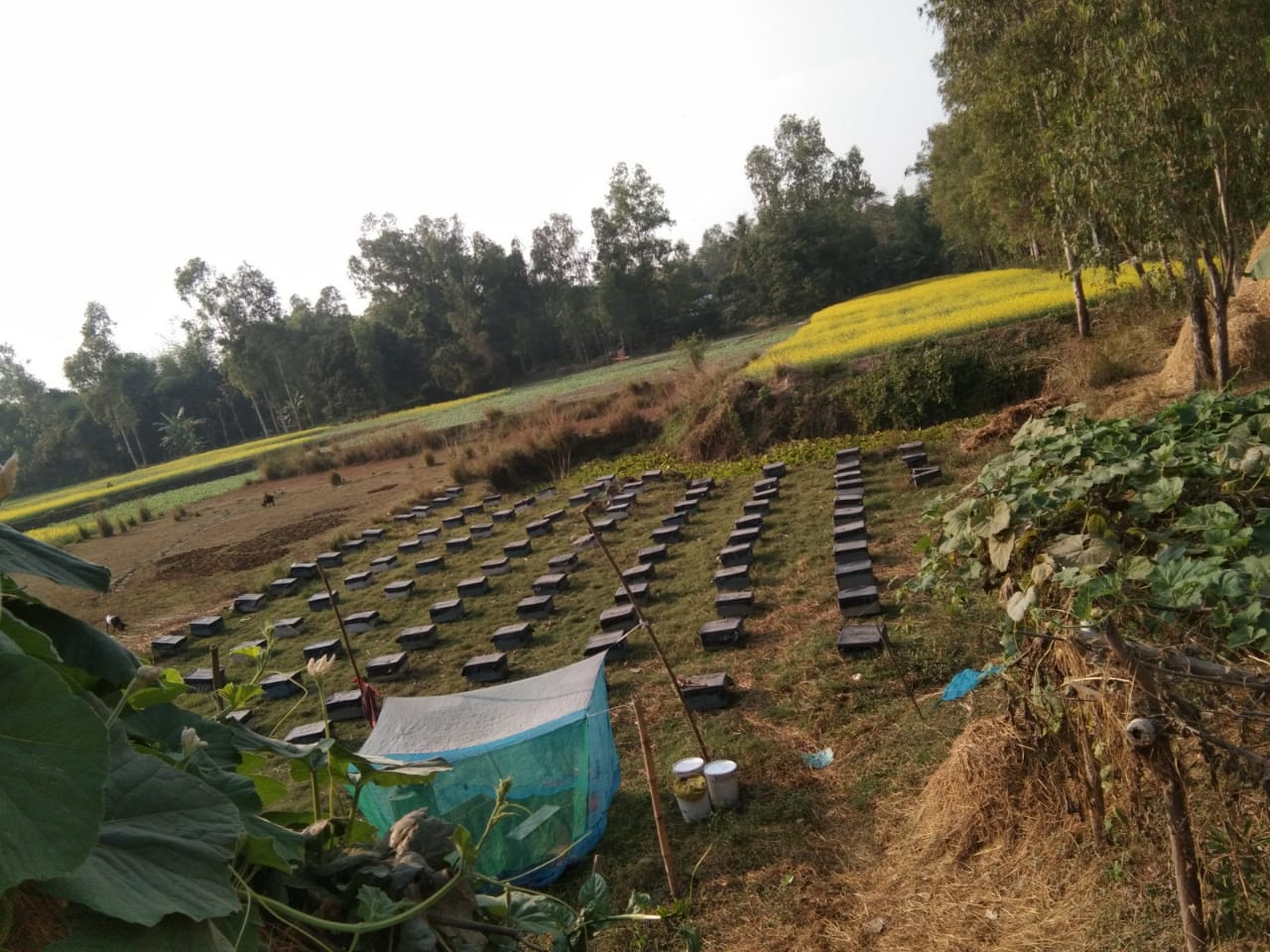

Mukti Migrating Bee Boxes for Continuous Production

Mukti is driving the beekeeping project as a pilot project for vulnerable communities of Sundarban as a self-sustainability initiative. Before introducing beekeeping as a sustainable livelihood to people, there is a need for research on the nature, character, and habitat of bees. The bees that were being reared at Purba Sridharpur Mukti SAM office premises were mainly Italian bees. Last August, with the end of the flowering season in the Sundarbans, the honeybees migrated in search of flowers, and the boxes used for rearing the bees were lying unused.

In order to continue honey production, Mukti has defined the regions and seasonal flower production zones to migrate the bee boxes accordingly. From August to November, 40 boxes were migrated to Rayna No 1 of North 24 Parganas district and now they are located at Pakuyahat village of Malda district. The production of honey from these boxes will increase by at least 5 times in the months from December to March as the Eucalyptus and Mustard crops will be in full bloom during that time.
Mukti Honey Beekeeping project supervisor Mr. Palash Bairagi is in charge of the boxes and is visiting the districts where the boxes are being sent. He is improving his knowledge of beekeeping in this process. He will serve as a trainer in Purba Sridharpur for anyone interested in taking up beekeeping as an occupation as a livelihood.
The bee boxes will be returned to Mukti in March-April 2023. It is estimated that each of these bee boxes will produce nearly 6-7 kg of honey during the peak season. Further, the beekeepers will be able to migrate their boxes to nearby districts where honey bees will find an abundance of pollen and nectar and thus add to honey production.
Project Activities
- About Mukti (2)
- Accreditation (31)
- AGM (63)
- Agriculture Reforms (16)
- ahm2017 (4)
- ahm2017news (2)
- ahm2017runners (2)
- ahm2018runners (1)
- Ambulance Service (2)
- Amplifying Community Voices (9)
- Awards (22)
- Awareness and Empowerment (13)
- Awareness drives (1)
- Book-Bank (13)
- Careers (8)
- CARR (32)
- Ccp1011 (4)
- Chick Rearing Programme for Marginalised Women (5)
- Climate Resilience River Embankment (1)
- Coaching Center (102)
- Community Clinic (2)
- COVID19 (62)
- Cyclone Amphan Relief and Rehabilitation (129)
- Cyclone Bulbul Relief (30)
- Cyclone Relif (2)
- Cyclone Yaas Relief and Rehabilitation (68)
- Editorial (21)
- Editorial by Abir Biswas (1)
- Editorial by Ankita Kothiyal (1)
- Editorial by Kasturi Bakshi (1)
- Editorial by Prof. Pradeep Ray (1)
- Editorial by Ranitendranath Tagore (1)
- Editorial by Sankar Halder (10)
- Editorial by Satyajit Ray (3)
- Editorial by Sohini Mehta (1)
- Editorial by Soumitra Bose (1)
- Editorial by Subhankar Basu (1)
- Education and Enrichment (34)
- Environment and Resilience (9)
- Essential Items Distribution (19)
- Fair/Exibition (1)
- Featured Activities (10)
- Go Green (81)
- Gram Clinic (2)
- Green (20)
- Health (8)
- Health Water & Sanitation (17)
- Hello Beta (1)
- Impact Stories List (31)
- Integrated Development (11)
- Jal hi Kal (2)
- Kerala Flood Relief (3)
- Kitchen Gardening (2)
- Livelihood & Enablement (20)
- Marathon (13)
- MCDF (14)
- Mcdf (112)
- Mcom (6)
- Medical Camp (8)
- MIT (3)
- MKSS (6)
- MSS (11)
- MUKTI Community Shop (1)
- Mukti Craft (2)
- Mukti Cultural (1)
- Mukti Employment (2)
- Mukti Fresh (2)
- Mukti Gram - Egra (2)
- Mukti Gram - Purbashridharpur (8)
- Mukti Gram, Model Village (136)
- Mukti Green (6)
- MUKTI Institute of Technology (MIT) (3)
- Mukti Kishalaya (2)
- Mukti Support (1)
- Mukto Dhara (1)
- NaRKEL (9)
- Obituaries (4)
- Observance Days Celebration (10)
- Organic Farming (3)
- Organic Farming & Training Support (8)
- Pandemic Support (2)
- Pond Rejuvenation (1)
- Prerana (4)
- Projects For Mukti Wide (3)
- Rights and Special Needs (19)
- Riste (2)
- RTI (14)
- Sahosini (3)
- SAM (9)
- Sam (89)
- SDF (9)
- Skill & Enterprise Development (2)
- Skill Enterprise (2)
- star-of-the-week (9)
- STEP (1)
- Success Stories (39)
- Success Story Coaching Center (1)
- Success Story MCDF (6)
- Success Story RTI (1)
- Success Story SAM (9)
- Success Story TSS (20)
- Sundarbans Green (SUN-G) (1)
- Sunderban development fair project (7)
- Sustainable Agriculture (2)
- SWAS (2)
- SwasthoSongini (4)
- Swavlamban Accelerator in Sundarbans (SWAS) (2)
- Talented (2)
- Tour for Cause (31)
- TSK25 2017 (7)
- TSK25 2017 Runners (7)
- TSS (17)
- TSS (112)
- Uncategorized (59)
- Valued Partners (3)
- Vclpk (1)
- Vetp (2)
- View (2)
- VOICE (2)
- workshop (109)